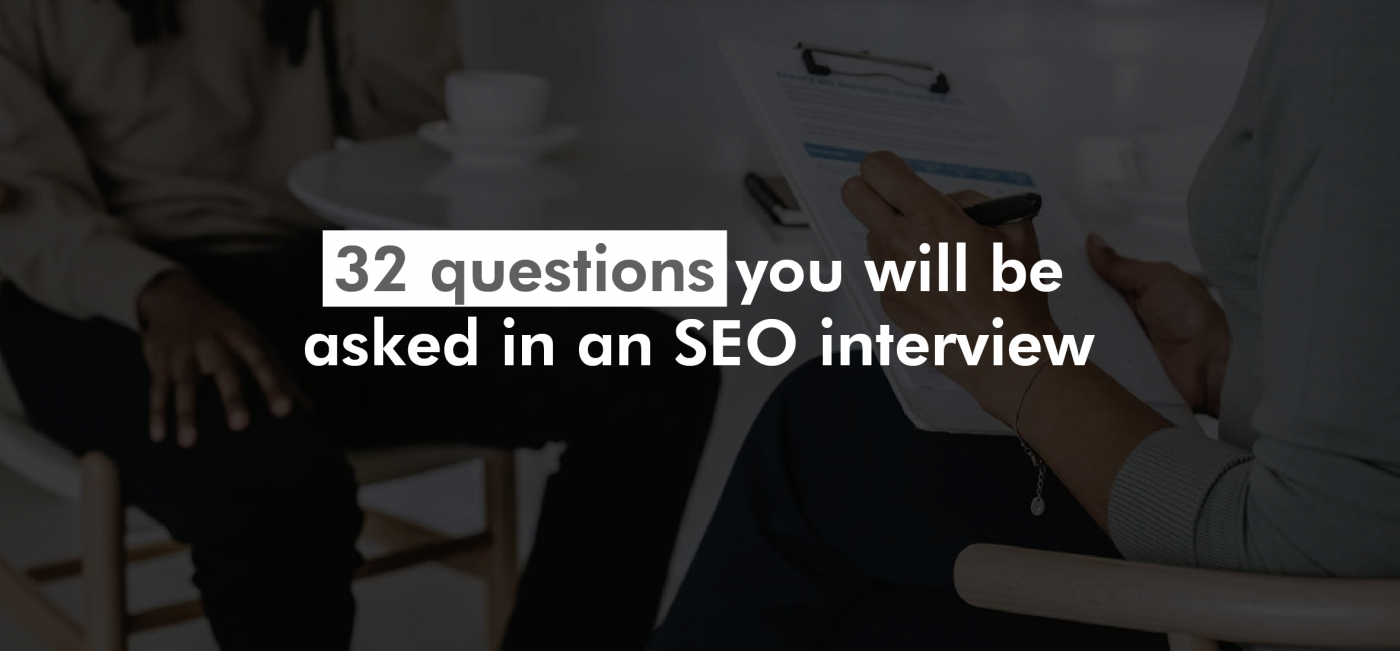Are you looking for a job in SEO? Do you have to select personnel? We talked to Gabriel Ghignone, head of Human Resources at Punto Rojo. Here is what he told us.
I’ve never been a fan of judging a candidate’s “qualifications” by their academic qualifications. Of course, they provide a useful overview.
However, in the case of an SEO analyst, what information do the studies provide regarding experience? That’s what we usually really care about in an SEO interview.
True experience means more than just years and years in a position. This can also be relative: someone with one year of “experience” may have more applicable knowledge than someone with five years or more.
There has to be another way to measure work experience. The following questions are designed to do just that, at least for those working in the SEO industry!
This list will be useful for those who have to assume the challenge of selecting personnel and for those who want to work in SEO. Don’t miss it!

1. What interests you about this position?
This is my favorite first question in an interview, as it gets right to the point. The answers can be broad as candidates expose their knowledge or experience in SEO. Or it can also happen that candidates have been attracted to the company, have little practice in SEO, but a lot of interest in working and taking on challenges.
2. How long have you studied and performed SEO?
I have found that years of SEO experience have little relevance to a candidate’s actual job knowledge and ability to get results. However, this is a good question to measure not only how long they have been in SEO, but what brought them into the industry.

3. How do you think your specific expertise will benefit us?
This question goes to the heart of the previous question. It serves to find out what value the candidate brings to the company. If they don’t know what value they bring, they may not have much to offer.
4. Describe your perfect job in Digital Marketing
Let the candidate tell you exactly what they would love to do every day to see if this bears any resemblance to what you are looking for. If this dream job has little in common with what the company offers, this will likely lower the grade. However, if the two align, you may have found an interesting pairing.
5. What do you like about SEO? Why do you choose it as an activity?
Do they love SEO? or, perhaps, are they applying as a stepping stone to another job in digital marketing that they would like? How much does this matter to the company?
6. What is your favorite thing to do every day in your current or previous job?
It allows you to determine if the candidate could be aligned with your company’s day-to-day and work objectives.
7. What is your specialty in SEO?
Depending on what they answer, the question to ask yourself is: is this useful to my work team?

8. What specific SEO verticals do you have experience in?
This allows us to know the general breadth of expertise in SEO and its related verticals. It is assumed that we are not looking for candidates with expertise in all verticals, but it allows us to see what their general competencies are.
9. On a scale of 1 to 10, how would you rate yourself as an SEO analyst?
I love the self-assessment questions. Based on all these questions, we get an insight into the candidate’s skills and experience as well as good clues about their personality.
10. How do you base your rating?
Related to the previous question. This question completes it. It is about knowing what criteria the candidate uses for self-evaluation. If they don’t know how to base their mark well…
11. What do you need to do to get to the next level?
Assuming they didn’t rate themselves a 10, there is always room for improvement. This is where we can find out if they know what the next step is in their career. Do they self-manage their career or do they go by what other colleagues tell them?

12. How do you stay organized and focused in your SEO work?
Learn a little about the candidate’s process for approaching SEO tasks. What tools do you use? Lack of organization or a volatile mindset can be a huge red flag.
13. What types of sites have you worked on and to what extent?
This question will help you get a first-hand understanding of the work they’ve done in the past. They should be able to show you some sites for you to review and point you to specific results. Complete this by having them describe how their involvement helped achieve those results.
14. What programming languages do you have experience with?
You want to know more than just the languages. The depth of their experience and understanding of each also matters. This knowledge can help you assess the candidate’s level and potential value to the company.
15. What CMS do you have experience with?
What is the candidate’s favorite content management system? Here we want to know which systems they have specific experience with and, again, to what extent. A well-rounded candidate will have experience with several CMSs.
16. What SEO tools do you use and why?
Every SEO has its favorite tools. They may or may not be the tools they use, but this is a good opportunity to discover their reasons for choosing one tool over another. And to know, in short, how the candidate is coming along in terms of common sense. It also allows you to explore whether they would be able to do their job effectively if that tool becomes unavailable.
17. What technical SEO skills do you have?
Is the candidate capable of performing a review and making recommendations on their own? Not all SEOs have skills as consultants, but they should have some technical skills that they can apply…
18. What non-technical skills do you have that are relevant to SEO?
Can the candidate write instructional blog posts? Do they have a good eye for spotting bad connections? Are they good at working in a team?
There are a lot of non-technical skills that are valuable for SEO. This is where the candidate tells what differentiating value they can bring.
19. What is their specific experience with social media, content development, and metrics?
What is the candidate’s experience outside of SEO? Although you are not hiring someone for other positions, there may be times when some of these jobs may need to be performed by the SEO analyst themselves.
Their level of competence in these areas may tip the scales in their favor. But be careful; try to inquire about that experience to verify that the candidate is not out of the SEO profile.

20. What do you know about Link Building?
This, as we know, is one of the most important resources to achieve good positioning. Even if the job search aims at another position with no links to Link Building, your knowledge in this area can be decisive.
21. What do you know about Link Baiting?
Same as above.
22. Have you ever done a detailed SEO audit?
Unless they are fairly new to SEO, every analyst candidate should have experience performing a highly detailed site audit. Use this question to discuss what types of data they are looking for when performing their audit.
23. How does Analytics help us in SEO and what configurations can be made?
Being able to set up a Google Analytics account is not an exclusive knowledge for an SEO, but it is a very valuable skill. Find out if they have done more than just install code, such as setting up various types of goals and tracking. At the same time, try to understand what metrics the candidate looks at, what kind of information they extract and what it is for.
24. What are the different ways to keep a site out of Google’s index? Which ones do you use and when?
There are several ways to do this, what methods do you know, why, and when would you use one over another?
25. If you could build a tool that doesn’t exist today, what would you do?
Regardless of whether the SEO analysts can create their tool, they should have some ideas for tools that they would like to see. This answer can give insight into several areas of SEO expertise, knowledge, and even skill, plus, of course, common sense.
26. Take an average eCommerce: how many hours do you think you would need to invest monthly for a successful digital marketing campaign?
The answer will depend on a lot of factors, but allow the candidate to outline those factors and take an opportunity to produce a personal response. Based on the factors they describe, the number of hours should be within reason.

27. How do you adapt to the needs of different clients?
This question is relevant for agencies… Some analysts have trouble interacting with clients and these are the source of the company’s capital income. What soft skills does the candidate have?

28. How often do you think you should communicate with clients and to communicate what specifically?
This is where you find out if the candidate wants to work alone or if he/she has experience communicating with supervisors and clients.
29. What do you do when you cannot perform a critical and urgent optimization?
This question illustrates the components of temperament and problem-solving skills. Find out how they react, who they hold responsible, and what skills they have in project development.
30. To what extent do you adhere to Google’s guidelines?
You may or may not care about Google’s guidelines, but every SEO analyst has an opinion about them. Define whether your adherence to those principles will be a barrier or help to the work you want them to do. How do you feel about algorithm changes?
31. Have you ever been penalized by Google, how did you determine that your site was penalized and what did you do to fix it?
Almost every SEO Manager has encountered a site that has suffered a Google penalty. The candidate’s answer to this question will help you learn more about their evaluation skills, as well as their ability to troubleshoot.

32. What is your most significant SEO success?
This question should be easy to answer. The question to ask yourself next is whether it’s worth getting excited about?

All these questions have been asked by me or by someone from my team at Punto Rojo. Of course, you can’t ask them all in the same interview, but you can choose the best ones to ask candidates depending on the SEO profile you are looking for.
I hope this content will be of value in this unique industry where there are so many myths and dark areas. If you are a candidate who is going to apply for an interview, don’t waste this material and prepare some random answers.

We want to know your opinion
Based on your experience in interviews to apply as SEO Analyst, what questions did they ask you that are not on this list? Are there any questions you were not asked that you think would be essential? Tell us about your experience with interviews to apply for the position of SEO Analyst.
¡Thank you Gabriel Ghignone!
Contact: gabriel@temotiva.com.ar



